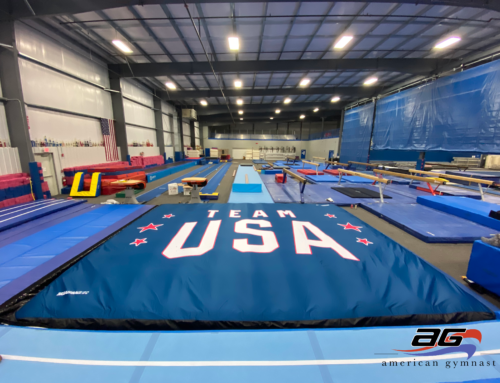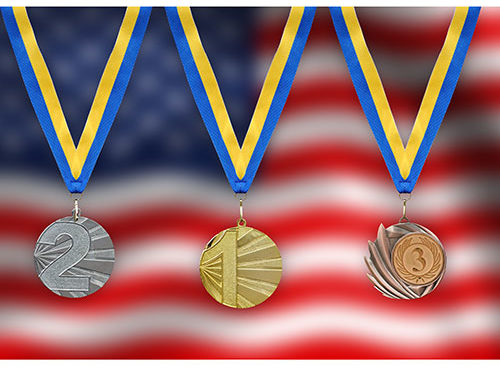An incredible performance by the U.S. men! I would say this is the best the U.S. men’s team has looked since winning the Olympic silver medal in 2004, and this team just might be capable of producing similar results both this year and next. Add in a healthy Paul Hamm, and it may be capable of even more.
The rivalry between Danell Leyva and Jonathan Horton was truly the highlight of the competition. Leyva has displayed the talent and potential to become a world class all-around competitor for the last several years, but this is the first time he has legitimately proven it on a competition floor. Hitting twelve for twelve absolutely top notch routines and displaying the champion-like confidence to match, Leyva was so on top of his game that he actually appeared genuinely disappointed when close challenger Horton fell from the high bar and made his victory seem too easy. Leyva has now reached the level of maturity in his gymnastics that allows him to see the big picture – to look even past the coveted national all-around title that sits immediately in front of him and onward to the team medal podium at the world championships and Olympic Games, where he knows there will be no room for falls from either one of America’s two stars.
The U.S. men have had a handful of world all-around contenders over the past twenty-five years, but this is the first time since 1984 when I can remember them boasting two legitimate all-around medal contenders on the same team. Leyva has improved his form, polish, and difficulty on essentially all six events, and Horton once again proved that an inconsistent preaseason will not prevent him from looking stunning at the national championships. These two will now continue to push each other over the coming weeks – whether it’s through antagonistic text messaging or training routines in the gym – and will hopefully both be in absolute peak form for the worlds in Tokyo.
The other big story of the meet was the battle for the six-man world team, which has yet to be announced but actually appears a little less wide open than in recent years. I’m sticking with my exact same team I envisioned after Day 1, which includes:
Danell Leyva
Jonathan Horton
John Orozco
Alex Naddour
Jake Dalton
Steven Legendre
Alternates: Chris Brooks and Brandon Wynn
I feel these six all truly proved themselves to be world championship worthy at this competition, and I would choose this team without hesitation. The biggest argument from some experts will undoubtedly be that the committee should choose a rings specialist like Brandon Wynn or even C.J. Maestas because the U.S. team lacks depth on this event, and also because having a strong ringsman is as close to a guaranteed big score as you can get in this sport. The U.S. team has adopted this “rings specialist” strategy time and time again over the past ten years, but with this particular team, I think we actually gain a little more by placing both Dalton and Legendre on the team and keeping Wynn as an alternate. Even Tim Daggett stated he didn’t believe that Dalton and Legendre could be used on the same team, but I’m going to suggest why I believe they can – using the actual numbers from the competition.
If we take the best scores of all of these guys between Days 1 and 2 at this competition and plug them into team scenarios, we find that the team I listed above (including both Dalton and Legendre) would actually outscore a team that replaces Steven Legendre with Brandon Wynn. This analysis simply involves plugging in the best scores from these guys on the events where they would likely be used at worlds. The numbers show that Legendre would have brought 1.15 points to the team on floor and vault, while Wynn would have brought just 0.95 to the team on rings. Interestingly, Maestas would have brought 1.2 to the team on rings based on his monstrous score on Day 2, but it’s hard to ignore the fact that he scored 1.15 lower on rings on Day 1, which would have only brought 0.05 to the team. These numbers do take into account the 0.3 special bonus that each of them received in this competition based on their high start values – Legendre on floor and vault and Wynn and Maestas on rings – as they won’t be receiving this bonus at worlds. Of course, Dalton outscored Legendre on both floor and vault, and thus he would theoretically bring even more to the team than Legendre would on these two events.
So in essence, I believe that not only can Dalton and Legendre be used on the same team, but that in fact both should be on the world team. They’ve both shown enough consistency on floor and vault this year to legitimize their spots, and they’ve shown they can potentially bring even more to the table than our most beastly rings specialists. The team will, of course, need to use Dalton, Legendre, or even Leyva as the third rings score, which may not sound ideal but the adrenaline of the world team finals does tend to help boost rings performances just a bit. And hopefully these three can squeak out a few more tenths on this event in the coming weeks, refining their strength positions, handstands, and landings. Perhaps having Brandon Wynn training each day as an alternate can push them to do just that.



Leave A Comment